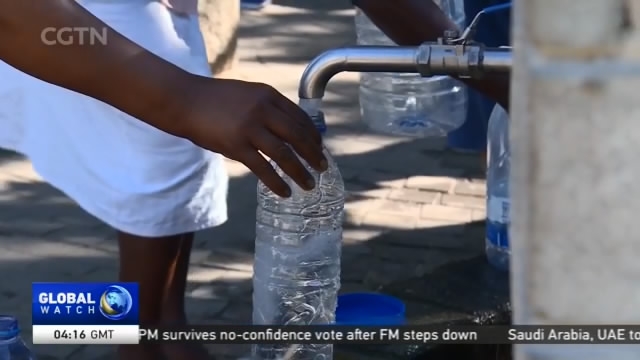
12:48, 14-Feb-2018
Cape Town Drought: Day Zero moved forward, city's taps to run dry by April 12

The 12th of April -- that's the new date just about every Capetonian is dreading -- when no more potable water will be available.
FAIRUZ MULLAGEE, RESEARCHER UNIVERSITY OF THE WESTERN CAPE "We've just sort of had to reconfigure our lives, in a way that there is no municipal water because that's what it is required of us in terms of preparing for 'Day Zero', opening that tap and there's nothing!"
But in some parts of the city, like this informal settlement, not having running water is a fact of life. Residents here rely on communal taps. While Cape Town's wealthier areas account for 65% of the city's overall water consumption, these densely populated communities only use around 5% per cent.
NOLAKHI NGXANGANA COOK, TSOGO SUN HOTELS "Oh, It's terrible. Because sometimes there's not even a note when the water is shut down, you just, when you go to the tap and the taps switch off. And you are working, the kids are supposed to go to school. And by the toilet, so the hygiene as well is affecting us because we don't have water to flush the shared toilet."
Stakeholders and officials have reached a consensus that Day Zero is unavoidable. Measures are now being put in place to deal with the actual disaster. It also means emergency services, the police, and the army along with the city and province are beginning to prepare the groundwork for over 200 water stations that will be set up to ration out water. Officials though have begun to draw up a list of priority areas for water supply such as schools, hospitals and the inner city CBD.
GAVIN CODE DEPUTY DIRECTOR OF PUBLIC WORKS WESTERN CAPE GOVERNMENT "We've got to ensure that the hospitals, the health services, can continue to operate in a constrained or a no-water situation. We similarly have a need for some of our social development facilities to be secure, water secure, not withstanding that the municipality doesn't have any water."
Although certain augmented water sources have begun to come online, every day, there is still over 600 million litres of water being used to maintain basic needs. Anxious residents are doing what they can to reduce their daily water consumption, such as collecting an additional 25 litre ration at the city's natural springs. More effective measures are anticipated, but as Zuma himself is being impeached, the people of South Africa may have to find their own ways to keep the taps running longer.

SITEMAP
Copyright © 2018 CGTN. Beijing ICP prepared NO.16065310-3
Copyright © 2018 CGTN. Beijing ICP prepared NO.16065310-3